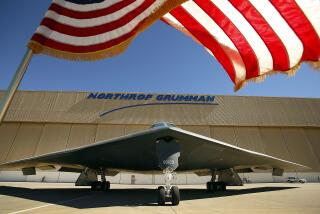Rockwell Ends Cubic’s Role in B-1B Programs
- Share via
SAN DIEGO — Attempting to cut costs and improve production schedules, Rockwell International has ended its contract with San Diego-based Cubic Corp.’s Defense Systems Division to develop three B-1B bomber trainer programs, Cubic and Rockwell confirmed Wednesday.
The termination by Rockwell, which is based in Pittsburgh, Pa., and is the second-largest Pentagon contractor, will cost Cubic about $18 million in lost sales.
All but five of the 200 workers in the defense division will be immediately absorbed into Cubic’s 4,400-member work force, officials said.
The programs include a B-1B bomber simulated training system as well as a computer-based system that lets training instructors know what malfunctions students must correct in each training session.
The programs have been relocated to Rockwell’s Lakewood, Calif., facility “for the convenience of Rockwell,” according to a memo written Wednesday by George Eaton, vice president and general manager of the defense division.
Rockwell’s termination of the contract is “not indicative of Cubic’s performance, which has been rated from good to excellent,” Eaton wrote.
Work on the bomber is now shifting from its manufacturing stage to initial delivery, a process, wrote Eaton, “that has generated major coordination problems among suppliers, Rockwell International . . . and the U.S. Air Force.”
In a brief statement issued Wednesday in response to a reporter’s query, Rockwell confirmed it had “assumed responsibility” for the B-1B training systems previously subcontracted to Cubic. The action, according to a spokesman, was taken “in the interest of the total program, with respect to scheduling and cost.”
Rockwell said that it plans to use some Cubic employees to complete “critical elements” of the training systems.
Cubic’s B-1B contracts with Boeing Military Aircraft Co. for the plane’s cockpit procedures trainer and radar simulator subsystem are unaffected by the Rockwell decision, according to the Eaton memo.
The total value of Cubic’s B-1B contracts with Rockwell was supposed to reach nearly $30 million. With the $18-million cancellation, however, the locally based company will realize only about $12 million in actual revenues from Rockwell since the contract took effect two years ago.
The defense division accounted for 43% of Cubic’s estimated $325 million in revenue for the year ended Sept. 30.
More to Read
Inside the business of entertainment
The Wide Shot brings you news, analysis and insights on everything from streaming wars to production — and what it all means for the future.
You may occasionally receive promotional content from the Los Angeles Times.










